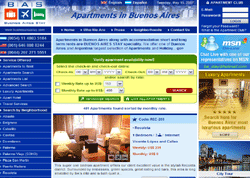Puerto Madero Buenos Aires
The Puerto Madero neighbourhood is Buenos Aires' newest district (barrio). Built on the site of a late 19th century port are luxury apartment towers that hug the (in)famous diques or artificial harbour basins by the Rio de la Plata. It boasts amazing late 19th century warehouses, wonderful modern bridges and some of the most stunning, modern architecture in Buenos Aires.
Towering shipping cranes, illuminated at night, have been left in place like exotic sculptures. Strolling day or night along the diques is a Porteno ritual that should not be missed. It is great fun on Sunday with music, entertainment and arts and crafts fairs. There are naval vessels turned into museums. Why not cross the diques via the Women's Bridge, designed by famous Spanish architect Santiago Calatrave. East of Puerto Madero is a vast marshy ecological reserve that is the best place in Buenos Aires to bird-watch, hike, jog or just get away from city life. To the west of Puerto Madero is Microcentro with its museums, historic government buildings and convenient access via public transportation to all other areas of Buenos Aires.
Most apartments in Puerto Madero have stunning city views or views over the Ecological Reserve to the Rio de la Plata. This is a very safe area with its own very evident security force.
It is home to an enormous variety of first-class cuisine, pubs, bars and discos. It is open day and night for formal and informal gatherings, business conferences or partying to the early hours.
Its history goes back to 1872, when the government decided to build a modern port for the coming century and accepted the proposals presented by Eduardo Madero. Work ended on 31 March 1898, but it was not until 1905 that the red brick warehouses, which now provide some of Buenos Aires most stunning waterside residences, were finished. The narrow canals and the sandbanks caused significant communication problems as cargo ships grew bigger, which was very bad for the economy of the time. The area was practically abandoned and the port moved to Puerto Nuevo in 1920.
In 1989, Puerto Madero Corporation was created to rebuild the 170 hectares of the old port into the marvellous urban living and work complex that we see today. Part of Dock 1 holds the Cinemark multi-screen cinema complex that has a capacity for 1500 people. From Docks 2 to 4, visitors can find the most exclusive restaurants, fast food outlets, pubs and the Argentine Catholic University (UCA). Some of the main places to visit are:
• Republica Building: This modern building was designed by Mario Alvarez and Cesar Pelli in the form of a prow. From its top you may view the North Port, the Nature Reserve that stretches along the Rio de la Plata. It is one of the few buildings with a heliport. It is located on the block formed by Viamonte, Bouchard, Córdoba and Madero avenues.
• Telecom Building: at 70 meters high this building was designed by Kohn, Pedersen and Fox, the famous firm from New York, in combination with their Argentinean partners Hampton, Rivoira and Associates. It has 15 floors that occupied an area of 32000 square meters.
• Post Office Building: It was designed by the French architect Norbert Maillart and inaugurated on 1928. Its interior was recently restored and it contrasts well with its imposing and elegant style.
• Luna Park: This building was built in 1931; it was originally one of the most important boxing stadiums in Argentina, if not the world. There is still some boxing, or music concerts, ballets, circus and ice skating shows. It occupies the block between Lavalle, Madero, Corrientes and Bouchard avenues.
• Frigate Sarmiento Museum Ship: This ship built in 1897 with an English style laid up at Dock 3 and was used to train naval cadets. It has kept all the original machinery and furniture.
• Former Immigrant’s Hotel: Now houses several government agencies, but after its inauguration in 1911 it was used to lodge immigrants from all over Europe. It is located at 3355 Antártida Argentina Ave.
Important information links for a fantastic Buenos Aires Stay
